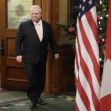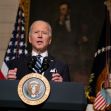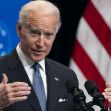On January 20, his final day in office, Trump issued a proclamation to exempt the U.A.E. from a 10% tariff on aluminum imports and indicated that a quota would suffice. Tariffs were first imposed in 2018, and in exempting the U.A.E., Trump cited “an important security relationship.” Trump also signed a deal to sell the U.A.E. 50 Lockheed Martin F-35 fighter jets. The Biden administration said it would temporarily pause that deal, and others, for review.
The exemption was to take effect on February 3. President Biden blocked the exemption on Monday, February 1. In a proclamation, he wrote: “In my view, the available evidence indicates that imports from the U.A.E. may still displace domestic production, and thereby threaten to impair our national security. I believe that maintaining the tariff is likely to be more effective in protecting our national security than the untested quota.”
Biden said that the U.S. Commerce Department could have granted U.A.E. producers exemptions if domestic producers were found to be unharmed. Instead, though, it denied 32 of 33 exemption requests from U.A.E. producers before Trump’s last-minute exemption proclamation. Biden said that the need to revive aluminum facilities, open closed smelters and mills, and boost domestic production that was the basis for Trump’s initial tariff in 2018 still exists.
CRU Group, a commodity researcher, says 11.5% of total U.S. aluminum imports last year through November came from the U.A.E., and about 14% came in 2019. CRU Group also found that the U.A.E. metal accounted for 11% of all aluminum consumed in the U.S.
Many of Trump’s last actions before leaving office are being examined. Biden has imposed a temporary freeze on U.S. arms sales to Saudi Arabia. He is reviewing the U.A.E.’s weapons transaction that Trump approved, which amounts to billions of dollars.
The Trump administration imposed tariffs on steel (25%) and aluminum (10%) in March 2018, saying that these imports threatened U.S. national security. The tariffs went into effect for the imports from nearly every country in the world, but exemptions, such as those made for Mexico, Argentina, Australia, and Canada, existed.
The decision to lift the tariffs was led by Trump’s son-in-law, Jared Kushner, among others, who had just worked to negotiate normalized relations between Israel and the U.A.E. Further, before taking office, Trump pursued various real estate projects in the U.A.E. He opened his Trump International Golf Club in Dubai in early 2017, just after he became president.
A White House spokeswoman said that Biden’s actions are not “derogative to the close diplomatic relationship between the United States and the U.A.E.,” but are part of a broader review of the Trump Administration’s trade policies. “President Biden’s priority is to re-establish an intelligent process for foreign policymaking and trade policy based on deliberative economic analysis and a strategy that ensures a level playing field for the American worker to compete internationally.”
Michael Bless, CEO of Century Aluminum Co., was vocal in his support of the original tariffs and indicated in a statement that Biden’s decision will ensure that U.A.E. imports won’t threaten U.S. National security.
United Steelworkers President Tom Conway said, “If Trump’s actions were allowed to become effective, U.A.E.’s state-supported aluminum producers would have had the right to flood the U.S. market, resulting in new trade attacks on our industry. In short, as he was walking away from the White House, Trump demonstrated that his concern for American workers was a facade and that he was willing to sacrifice their jobs and security.”
The U.S. imported $1.3 billion of U.A.E. aluminum in 2019. Aluminum is the U.A.E.’s biggest export by value to the U.S.






